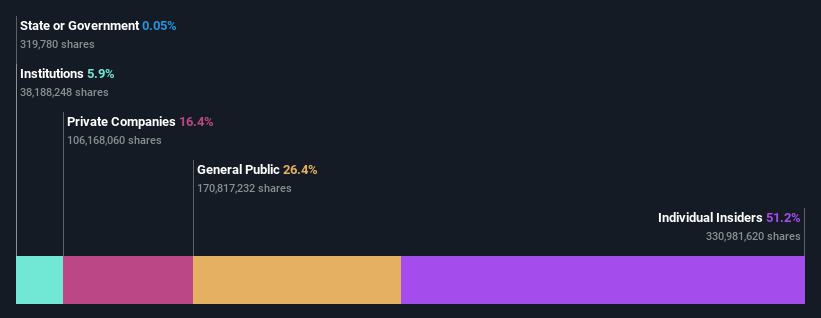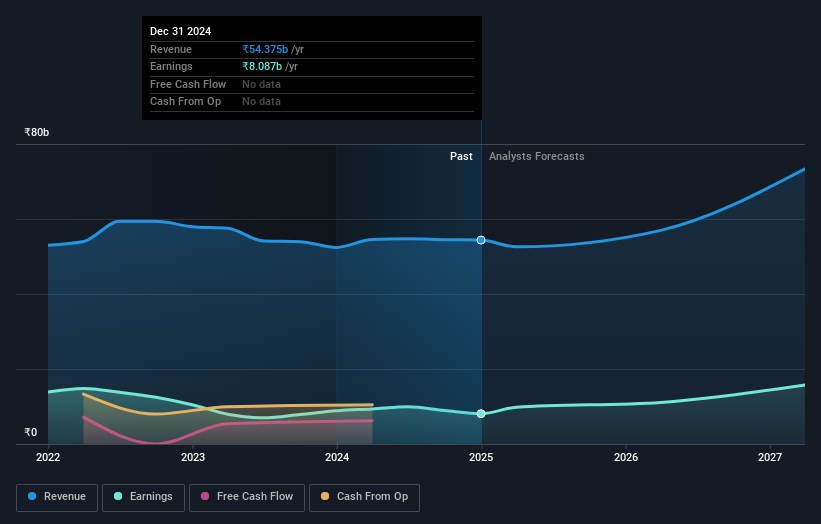- India
- /
- Metals and Mining
- /
- NSEI:GPIL
Godawari Power & Ispat Limited's (NSE:GPIL) most bullish insider, CEO Bajrang Agrawal must be pleased with the recent 4.2% gain
Key Insights
- Significant insider control over Godawari Power & Ispat implies vested interests in company growth
- 53% of the business is held by the top 11 shareholders
- Past performance of a company along with ownership data serve to give a strong idea about prospects for a business
If you want to know who really controls Godawari Power & Ispat Limited (NSE:GPIL), then you'll have to look at the makeup of its share registry. And the group that holds the biggest piece of the pie are individual insiders with 51% ownership. In other words, the group stands to gain the most (or lose the most) from their investment into the company.
Clearly, insiders benefitted the most after the company's market cap rose by ₹5.3b last week.
Let's delve deeper into each type of owner of Godawari Power & Ispat, beginning with the chart below.
See our latest analysis for Godawari Power & Ispat

What Does The Institutional Ownership Tell Us About Godawari Power & Ispat?
Many institutions measure their performance against an index that approximates the local market. So they usually pay more attention to companies that are included in major indices.
Godawari Power & Ispat already has institutions on the share registry. Indeed, they own a respectable stake in the company. This can indicate that the company has a certain degree of credibility in the investment community. However, it is best to be wary of relying on the supposed validation that comes with institutional investors. They too, get it wrong sometimes. When multiple institutions own a stock, there's always a risk that they are in a 'crowded trade'. When such a trade goes wrong, multiple parties may compete to sell stock fast. This risk is higher in a company without a history of growth. You can see Godawari Power & Ispat's historic earnings and revenue below, but keep in mind there's always more to the story.

Godawari Power & Ispat is not owned by hedge funds. The company's CEO Bajrang Agrawal is the largest shareholder with 8.5% of shares outstanding. In comparison, the second and third largest shareholders hold about 6.4% and 5.9% of the stock. Interestingly, the second-largest shareholder, Dinesh Agrawal is also Senior Key Executive, again, pointing towards strong insider ownership amongst the company's top shareholders.
After doing some more digging, we found that the top 11 have the combined ownership of 53% in the company, suggesting that no single shareholder has significant control over the company.
Researching institutional ownership is a good way to gauge and filter a stock's expected performance. The same can be achieved by studying analyst sentiments. There is some analyst coverage of the stock, but it could still become more well known, with time.
Insider Ownership Of Godawari Power & Ispat
While the precise definition of an insider can be subjective, almost everyone considers board members to be insiders. The company management answer to the board and the latter should represent the interests of shareholders. Notably, sometimes top-level managers are on the board themselves.
Insider ownership is positive when it signals leadership are thinking like the true owners of the company. However, high insider ownership can also give immense power to a small group within the company. This can be negative in some circumstances.
Our information suggests that insiders own more than half of Godawari Power & Ispat Limited. This gives them effective control of the company. Insiders own ₹67b worth of shares in the ₹130b company. That's extraordinary! It is good to see this level of investment. You can check here to see if those insiders have been selling any of their shares.
General Public Ownership
With a 26% ownership, the general public, mostly comprising of individual investors, have some degree of sway over Godawari Power & Ispat. While this group can't necessarily call the shots, it can certainly have a real influence on how the company is run.
Private Company Ownership
Our data indicates that Private Companies hold 16%, of the company's shares. It might be worth looking deeper into this. If related parties, such as insiders, have an interest in one of these private companies, that should be disclosed in the annual report. Private companies may also have a strategic interest in the company.
Next Steps:
I find it very interesting to look at who exactly owns a company. But to truly gain insight, we need to consider other information, too. Take risks for example - Godawari Power & Ispat has 1 warning sign we think you should be aware of.
If you would prefer discover what analysts are predicting in terms of future growth, do not miss this free report on analyst forecasts.
NB: Figures in this article are calculated using data from the last twelve months, which refer to the 12-month period ending on the last date of the month the financial statement is dated. This may not be consistent with full year annual report figures.
New: Manage All Your Stock Portfolios in One Place
We've created the ultimate portfolio companion for stock investors, and it's free.
• Connect an unlimited number of Portfolios and see your total in one currency
• Be alerted to new Warning Signs or Risks via email or mobile
• Track the Fair Value of your stocks
Have feedback on this article? Concerned about the content? Get in touch with us directly. Alternatively, email editorial-team (at) simplywallst.com.
This article by Simply Wall St is general in nature. We provide commentary based on historical data and analyst forecasts only using an unbiased methodology and our articles are not intended to be financial advice. It does not constitute a recommendation to buy or sell any stock, and does not take account of your objectives, or your financial situation. We aim to bring you long-term focused analysis driven by fundamental data. Note that our analysis may not factor in the latest price-sensitive company announcements or qualitative material. Simply Wall St has no position in any stocks mentioned.
About NSEI:GPIL
Flawless balance sheet with reasonable growth potential and pays a dividend.
Similar Companies
Market Insights
Community Narratives



